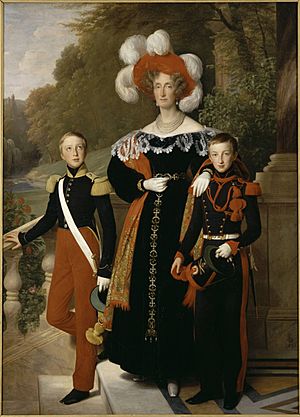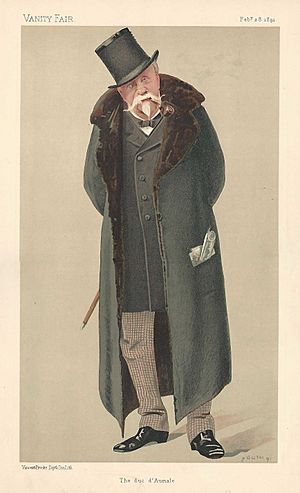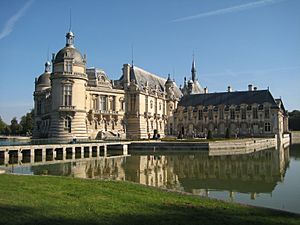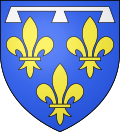Henri d'Orléans, Duke of Aumale facts for kids
Quick facts for kids Henri d'Orléans |
|||||
|---|---|---|---|---|---|
| Duke of Aumale | |||||
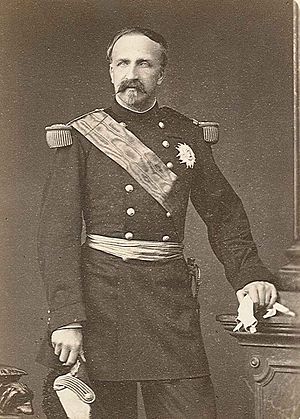
Portrait by Appert, c. 1870
|
|||||
| Born | 16 January 1822 Palais Royal, Paris |
||||
| Died | 7 May 1897 (aged 75) Giardinello, Sicily |
||||
| Burial | Royal Chapel, Dreux, France | ||||
| Spouse | Carolina Augusta of the Two Sicilies | ||||
| Issue Among others... |
Louis, Prince of Condé François Louis, Duke of Guise |
||||
|
|||||
| House | Orléans | ||||
| Father | Louis Philippe I | ||||
| Mother | Maria Amalia of Naples and Sicily | ||||
| Religion | Roman Catholicism | ||||
| Signature | 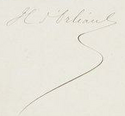 |
||||
Henri Eugène Philippe Louis d'Orléans, Duke of Aumale (born January 16, 1822 – died May 7, 1897) was an important French leader. He was part of the Orleanists, a group in the 1800s who wanted France to have a king with limited power, like in a constitutional monarchy.
Henri was born in Paris. He was the fifth son of King Louis-Philippe I of the French and Maria Amalia of Naples and Sicily. He held the title of Duke of Aumale.
He became an army officer and fought in the French conquest of Algeria. In 1847, he was made the Governor-General of Algeria. After the French Revolution of 1848, he moved to England. There, he spent his time studying history.
When the Franco-Prussian War happened, he was able to return to France. He was elected to parliament and became a member of the Académie française, a famous French academy. In 1872, he rejoined the army as a general. From 1879 to 1883, he was the inspector-general of the army.
The Duke of Aumale was also a big art collector. He gave his amazing Château de Chantilly to the Institute of France. This allowed his large art collection to be shown to everyone.
Contents
Early Life and Inheritance
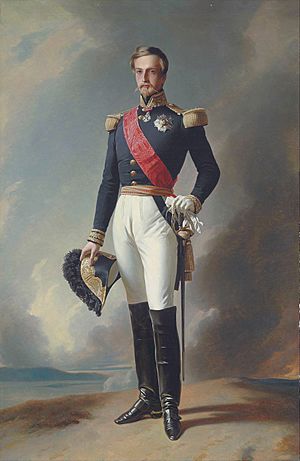
Henri was born at the Palais-Royal in Paris. His parents raised him in a fairly simple way, even though they were royalty. When he was eight years old, he inherited a huge fortune. This came from his godfather, Louis Henry II, Prince of Condé, who was the last Prince of Condé.
This inheritance was worth about 66 million livres, which would be around £200 million today. It included the famous Château de Chantilly, the Château d'Écouen, and other large estates.
He went to school at the Collège Henri IV. At seventeen, he joined the French army as a captain.
Family and Children
On November 25, 1844, when he was 22, Henri married Princess Maria Carolina of the Two Sicilies in Naples. She was the daughter of Leopold of the Two Sicilies, Prince of Salerno.
Henri and Maria Carolina had several children. Sadly, most of them died very young. Only two of their children lived to be adults, but they also passed away before their father.
- Louis Philippe Marie Léopold d'Orléans, Prince of Condé (born November 15, 1845 – died May 24, 1866). He died without marrying or having children.
- Henri Léopold Philippe Marie d'Orléans, Duke of Guise (born September 11, 1847 – died October 10, 1847). He died as a baby.
- A daughter who was stillborn (August 16, 1850).
- François Paul d'Orléans, Duke of Guise (born January 11, 1852 – died April 15, 1852). He also died as a baby.
- François Louis Philippe Marie d'Orléans, Duke of Guise (born January 5, 1854 – died July 25, 1872). He died without marrying.
- A son who was stillborn (May 1857).
- A son who was stillborn (June 15, 1861).
- A son who was stillborn (June 1864).
Military and Political Career
Henri showed great skill during the French conquest of Algeria. In 1847, he became a lieutenant-general. He was appointed Governor-General of Algeria from September 27, 1847, to February 24, 1848.
During his time as Governor-General, he accepted the surrender of Emir Abdel Kadir in December 1847. After the French Revolution of 1848, Henri moved to England. There, he focused on studying history and military topics. In 1861, he wrote a letter about French history.
In 1862, King Otto of Greece was overthrown. The Greeks wanted a new king. Henri's name was suggested, but eventually, Prince William of Denmark was chosen as the new King of the Hellenes in March 1863.
When the Franco-Prussian War began, Henri offered to serve in the French army. However, his offer was turned down. He was elected to parliament as a representative for the Oise region and returned to France. He also took a seat in the Académie française.
In March 1872, he rejoined the army as a Divisional General. In 1873, he led the military court that sentenced Marshal Bazaine to death.
Henri then became commander of the VII Army Corps at Besançon and left political life. In 1879, he became the inspector-general of the army. However, a law passed in 1883 removed all members of former royal families from their military positions. So, Henri was put on a special list, meaning he was no longer actively serving.
In 1886, another law was passed. This law forced the heads of former royal families to leave France. It also said that members of these families could not hold any public jobs or be elected to public offices. Henri strongly protested this, but he was still forced to leave France.
In his will, written in 1884, Henri left his Chantilly estate to the Institute of France. This included the Château de Chantilly, which he wanted to become a museum for his large art collection. When this generous gift was made public, the French government allowed him to return to France in 1889.
A Passion for Books and Art
| Royal styles of Prince Henri, Duke of Aumale |
|
|---|---|
 |
|
| Reference style | His Royal Highness |
| Spoken style | Your Royal Highness |
| Alternative style | Sir |
Henri was a famous collector of old books and handwritten documents. He owned the very important medieval book called Très Riches Heures du Duc de Berry. Most of his collection is still kept at Chantilly today.
Later Life and Death
Henri d'Orléans, Duke of Aumale, died in Lo Zucco, Sicily. On May 4, 1897, a terrible fire happened at the Bazar de la Charité in Paris. It killed 126 people, mostly noble women. Henri wanted to send his sympathy to the families who lost loved ones. After writing twenty letters, he had a heart attack and passed away. He was buried in Dreux, in the chapel where other members of the Orléans family are buried.
Honors and Recognition
Henri received many honors throughout his life:
- 1842: Grand Cross of the Legion of Honour (France's highest award)
- March 22, 1842: Grand Cordon of the Order of Leopold (Belgium)
- September 6, 1845: Knight of the Golden Fleece (Spain)
- 1864: Grand Cross of the Saxe-Ernestine House Order (German duchies)
- May 22, 1886: Grand Cross of the Order of the Tower and Sword (Portugal)
- 1887: Member of the Royal Academy of Science, Letters and Fine Arts of Belgium.
- 1890: A type of butterfly from China, P. orleans, was named after him by Charles Oberthür because the Duke discovered it.
- Grand Cross of the Order of St. Ferdinand and Merit (Two Sicilies)
- Husainid Family Order (Tunisia)
- Member of the Académie française.
- Member of the Académie des sciences morales et politiques.
Coat of Arms
The Duke of Aumale did not have his own special coat of arms. Instead, he used the traditional arms of the House of Orléans, which looked like this:
- Blazon (description): A blue shield with three golden fleur-de-lis symbols, and a silver strip across the top.
- Coronet (crown): A crown used by a son of France.
- Supporters (figures holding the shield): Two angels.
- Personal motto (after 1871): J'attendrai (which means "I will wait").
See also
 In Spanish: Enrique de Orleans (duque de Aumale) para niños
In Spanish: Enrique de Orleans (duque de Aumale) para niños


